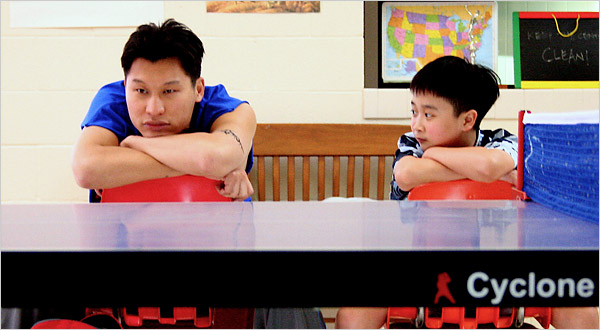|
Reviews of Recent Independent, Foreign, & Documentary Films in Theaters and DVD/Home Video

PING PONG PLAYA
China’s relentless Olympic gold rush almost makes the Chinese-American comedy Ping Pong Playa dated before it bounced from the festival circuit to a wider release. But it is saved by the bell with a gentle emphasis on poking fun at a model minority and athletic stereotypes. The film opens, and is dominated in the first half, by the bragging of twentysomething Christopher Wang, who calls himself “C-Dub” as he postures in hyperbolic African-American patois on a local Asian-American cable TV show about his athletic prowess. Actor Jimmy Tsai created his fast-talking comic persona for spoof commercials, which he then expanded into this feature script with director Jessica Yu, but the joke of a non-black talking jive has worn thin since Barbara Billingsley translated the lingo in Airplane. These jokes are a bit offset with the humor of his African-American best friend J P Money (Khary Payton) learning Chinese. Christopher’s unending riffs about the cultural and genetic disadvantages of Chinese Americans in basketball and other team sports are mostly funny at first, reinforced with the sight gag of the short Christopher playing against even shorter middle-school kids. But his racket starts to get repetitive and wear thin, and his preference for hanging around younger kids makes him even more stuck in his junior varsity glory days than Judd Apatow’s hapless heroes before the engaging plot finally kicks into gear. His hijinks cause his doctor/brother Michael (Roger Fang) to get into a car accident with their mother (Elizabeth Sung). Their minor injuries are just enough to keep Michael, as the reigning local ping pong champion, out of the Golden Cock Table Tennis Tournament, and his mother from leading her usual ping pong classes at the Chinese Community Center. (The double entendres abound, with a bouncing ball bleeping profanities.) Slacker Christopher finally has to step up to the table, first by supervising the classes and then competing in the tournament. With specific references to The Bad News Bears and Napoleon Dynamite, Christopher guides the usual band of middle-school losers at the center’s classes as “the yellow Fonzi.” Other than its Chinese-American setting, the film is only original in how low he goes in manipulating this motley crew who greatly admire him, especially to meet one kid’s beautiful and brainy sister. Though the conversations among the pushy mothers comparing their overachieving offspring are funny and the kids are cute, there are a lot of tired clichés about fat kids and Indian-American families where the satire falls flat. Exaggerated stereotypes play out as lame jokes, like the redneck table tennis referee (MADtv’s Stephnie Weir) and the barely-closeted competitive villain in hot pants and his dumb sidekick (Queer as Folk’s Peter Paige and Scott Lowell), who appear in a spoof commercial of their own after the closing credits. Though Yu has been directing television episodes besides her award-winning documentaries, such as Protagonist, the pacing and comic timing falter by the end of her feature film debut. That the Chinese have a passion for
ping pong is not exactly unknown to movie audiences, and has already
been a source of mockery, from Forrest Gump to Balls of Fury.
Though Ping Pong Playa is based on an original script, it is very
similar to a much better Japanese film,
Fumihiko Sori’s
Ping Pong, based on
Taiyo Matsumoto’s
manga that charmingly featured similar class, ethnic, and family issues,
with a showdown match and American pop culture inspiration. (Instead of
hip hop, its protagonist is inspired by Bruce Springsteen’s music).
Nora Lee Mandel
|

